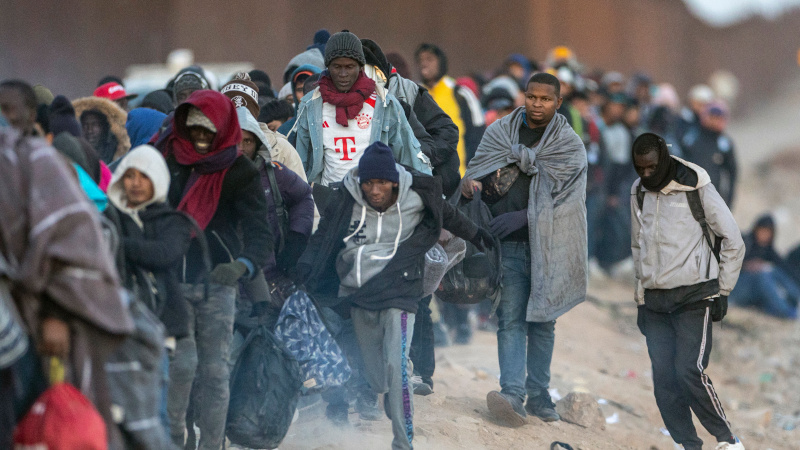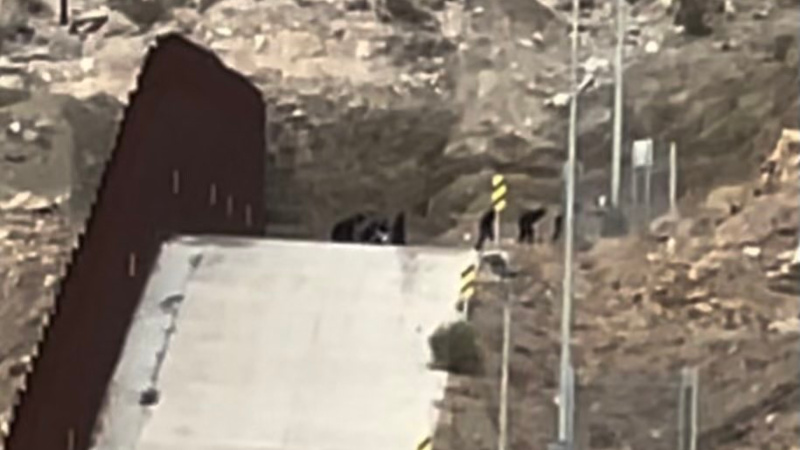 Image Credit: John Moore/Getty Images
Image Credit: John Moore/Getty Images “Can you understand the translator?” Judge Emmett Soper asks the respondent from Mauritania.
“Hmm?” the Mauritanian mumbles back.
“Can you ask him if he understands you?” Judge Soper asks the translator, who is video conferencing from his office.
“Hmmmmm,” the respondent mumbles again, this time louder.
“I have on file that the respondent’s preferred language is Arabic. Is that true? Can you ask him if he speaks Arabic?” the judge queries.
The translator prompts again, eliciting a “No” in English from the Mauritanian.
“Did he say ‘no’? Can you ask him what language he prefers to communicate in?” Judge Soper clarifies.
“Hassaniya,” is the reply.
“Okay, Hassaniya. I will change that for the preferred language. Our translator is speaking Hassaniya. Can you ask him if he understands you?” Soper asks.
Translator asks the respondent who answers in the affirmative. “He can understand me,” the translator tells the judge.
“Okay. Alright. Hassaniya. We can proceed then. I have changed the preferred language from Arabic to Hassaniya,” Judge Soper confirms.
This is how a Master Calendar Hearing started last week, during which six citizens of the West African country of Mauritania appeared before Judge Soper at the Executive Office for Immigration Review in Annandale, VA.
A Master Calendar Hearing is the first hearing in an immigration case where the judge outlines the process, explains rights and responsibilities, sets deadlines for future proceedings, and explains charges and allegations.
Normally, the respondent is charged with being in the country illegally, and the judge lays out those details. The judge can ask questions about their entry into the U.S., but no decision is made about the case or whether the person should be placed in Expedited Removal or allowed to stay in the country. That comes later.
“Is it correct that you crossed the border in August of 2023 at an unknown location?” Jude Soper asks the respondent.
Via the translator: “Yes. I was detained and paroled after.”
“And you didn’t have any immigration papers — a visa, travel ID, or any other papers with you, allowing you to enter the U.S.?”
“Correct.”
The respondent is just one of millions of aliens who crossed our borders illegally during the Biden era and were paroled into the U.S. with a Notice to Appear (NTA) in an immigration court at a future date.
Most of the African illegals I saw were dressed nice. They had to have money to fly to Nicaragua & pay the cartels thousands of dollars for transport to the border. pic.twitter.com/1wVDQYU2YZ
— Jeff Rainforth (@liberty_clarion) March 29, 2025
The House Committee on Homeland Security released startling data in June of 2024 which included monthly border encounters exceeding 240,000 per month for 11 straight months: “Since January 20, 2021, DHS has paroled more than two million inadmissible aliens into the interior and released roughly two million more with ‘Notices to Appear.’”
An NTA is a legal document that initiates removal proceedings against a noncitizen. It serves as a formal notification that the individual needs to appear before an immigration judge to answer charges that could lead to deportation.
Mauritania, officially the Islamic Republic of Mauritania, is a country of roughly five million people. It borders Western Sahara, Mali, Algeria, and Senegal. It is rich in iron and natural gas, but has a GDP of only $11 billion USD. In comparison, Vermont has a GDP of around $36 billion, the smallest in the country.
Mauritania is known as one of the last bastions of slavery on the planet, with some estimates indicating up to 18% of the population lives in bondage.
“Are you here for a hearing?” I ask a Mauritanian gentleman sitting across from me, waiting to enter the courtroom.
He stares blankly at me, not understanding. A slew of questions race through my mind, none of which I can ask.
“How did you get to Annandale, VA? How did you get to the southern border? Why did you come here? How do you function in our society while not speaking any English? Why did you leave your homeland? How did you even find out about the border? Did you travel with a smuggler?”
In 2023, the Associated Press (AP) published an article titled, “Thousands more Mauritanians are making their way to the US, thanks to a route spread on social media.”
West Africans were exploiting a new passage to the U.S. via Nicaragua that was being promoted on social media platforms and chat apps.
“Relaxed entry requirements allow Mauritanians and a handful of other foreign nationals to purchase a low-cost visa without proof of onward travel,” the AP noted.
@tapha901 #Senegal#Mauritanie#Nicaragua#USA#immigration#tiktok#galsen#pourtoi#foryou#Mali#viral ♬ son original – Moustapha Ba
In January of 2021, not a single Mauritanian was encountered at the southern border. In January of 2022, that number was nine. In January of 2023, it climbed to 282, signaling the explosion to come.
More than 15,500 Mauritanians were encountered during 2023, according to figures reviewed by the Washington Post.
The AP outlined the journey, which typically entailed a flight from Turkey to Colombia, followed by boat trip to Nicaragua, and then bus or train rides north to the U.S.
This new route bypassed the typical northbound treks through the jungles of South and Central America and utilized different smuggling operations.
This route also shifted West African migration away from Spain and other European countries.
“Many Mauritanians enter the U.S. in Yuma, Arizona. Some are dropped off on a Mexican highway by smugglers for a roughly two-hour walk through a knee-deep river, flat desert shrubs, and rocks. They surrender to U.S. Border Patrol agents in Yuma waiting under stadium lights where a wall built during Donald Trump’s presidency abruptly ends,” AP reported.
Last year, ABC 10 News in San Diego reported on the growing number of Mauritanians flooding the area.
Back in the courtroom, a DHS attorney submitted a motion to dismiss the charges and put the Mauritanian in the Expedited Removal process.
The lawyer tried to do this for every case, and sources tell Border Hawk this is the approach now being taken by many DHS attorneys. What this does is allow for the person to be deported to their home country much quicker.
Judge Soper denied this motion, as he did throughout the day, and an Individual Calendar Hearing was assigned for the coming months.
The judge provided instructions to the respondent and stated that he must be present for his future hearing. He dismissed the respondent who thanked the judge and left.
Waiting for him outside the courtroom were five federal agents who quickly detained the Mauritanian. He appeared confused by this development, and the agents were eager to take him out of the public area. He is likely being held in detainment until his next hearing.
This is also a new posture from DHS, which Border Czar Tom Homan told us speeds up the process.
https://x.com/Wid_Lyman/status/1939759805264220482?ref_src=twsrc%5Etfw%7Ctwcamp%5Etweetembed%7Ctwterm%5E1939759805264220482%7Ctwgr%5E91b3c363ff22973bbff7fdac97433b6e50eb1ea2%7Ctwcon%5Es1_c10&ref_url=https%3A%2F%2Fborderhawk.news%2Fexclusive-bidens-flood-of-west-african-migrants-now-swamping-us-immigration-courts%2FThis scenario was repeated multiple times during our time in court and happens daily around the United States. It is slow, convoluted, and requires an immense amount of resources.
With the passage of the One Big Beautiful Bill Act, more funding may be provided to hire thousands more immigration judges, or appropriate other judges to conduct Master Calendar Hearings.
Whatever the case, this is yet another troubling example of the problems caused by mass migration allowed by the Biden administration.



